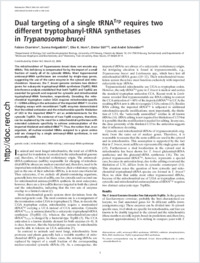Dual targeting of a single tRNATrp requires two different tryptophanyl-tRNA synthetases in Trypanosoma brucei
- Charrière, Fabien Department of Biology Cell and Developmental Biology, University of Fribourg, Switzerland
- Helgadóttir, Sunna Departments of Molecular Biophysics and Biochemistry, Yale University, New Haven, USA
- Horn, Elke K. Department of Biology Cell and Developmental Biology, University of Fribourg, Switzerland
- Söll, Dieter Departments of Molecular Biophysics and Biochemistry, Yale University, New Haven, USA - Department of Chemistry, Yale University, New Haven, USA
- Schneider, André Department of Biology Cell and Developmental Biology, University of Fribourg, Switzerland
-
2006
Published in:
- Proceedings of the National Academy of Sciences of the United States of America. - 2006, vol. 103, p. 6847-6852
English
The mitochondrion of Trypanosoma brucei does not encode any tRNAs. This deficiency is compensated for by the import of a small fraction of nearly all of its cytosolic tRNAs. Most trypanosomal aminoacyl-tRNA synthetases are encoded by single-copy genes, suggesting the use of the same enzyme in the cytosol and mitochondrion. However, the T. brucei genome contains two distinct genes for eukaryotic tryptophanyl-tRNA synthetase (TrpRS). RNA interference analysis established that both TrpRS1 and TrpRS2 are essential for growth and required for cytosolic and mitochondrial tryptophanyl-tRNA formation, respectively. Decoding the mitochondrial tryptophan codon UGA requires mitochondria-specific C→U RNA editing in the anticodon of the imported tRNATrp. In vitro charging assays with recombinant TrpRS enzymes demonstrated that the edited anticodon and the mitochondria-specific thiolation of U33 in the imported tRNATrp act as antideterminants for the cytosolic TrpRS1. The existence of two TrpRS enzymes, therefore, can be explained by the need for a mitochondrial synthetase with extended substrate specificity to achieve aminoacylation of the imported thiolated and edited tRNATrp. Thus, the notion that, in an organism, all nuclear-encoded tRNAs assigned to a given amino acid are charged by a single aminoacyl-tRNA synthetase, is not universally valid.
- Faculty
- Faculté des sciences et de médecine
- Department
- Département de Biologie
- Language
-
- English
- Classification
- Biological sciences
- License
- License undefined
- Identifiers
-
- RERO DOC 5724
- DOI 10.1073/pnas.0602362103
- Persistent URL
- https://folia.unifr.ch/unifr/documents/300110
Statistics
Document views: 91
File downloads:
- schneider_dts.pdf: 185
